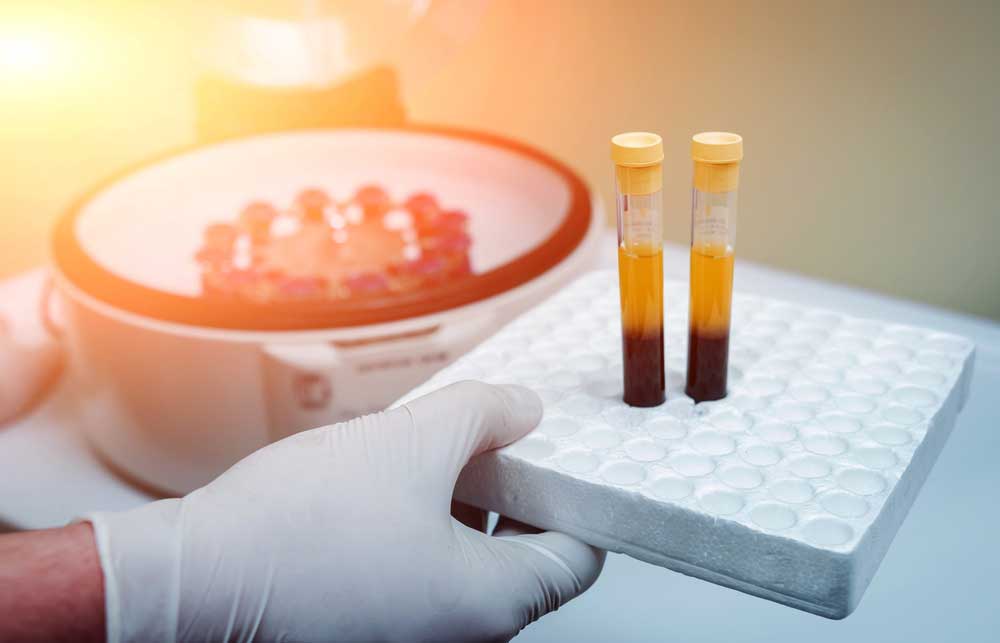What is Platelet-Rich Plasma (PRP) Therapy?
Platelet-rich plasma or PRP, is a high concentration of endogenous (one’s own) blood platelets, known for having the ability to help blood clot. These platelets have growth factors that are made up of a variety of proteins and help speed up the healing process after an injury. In orthopedic medicine, platelet rich plasma can be used, in select cases, as an alternative to surgery. Platelet-rich plasma has been demonstrated to have strong regenerative potential for damaged tendons, ligaments and orthopaedic soft tissue.
In addition, platelet-rich plasma has been shown to have significant anti-inflammatory benefits and in patients with early joint degeneration and arthritis, PRP can be a powerful tool for slowing the inflammatory cascade that leads to progressive arthritis.
PRP is one of the biologic treatments offered by Dr. Benedict Nwachukwu, orthopedic specialist that uses the body’s natural ability to accelerate healing after an orthopedic injury and that also mitigates the inflammation associated with early joint arthritis. For patients in Manhattan, New York City and the surrounding New York boroughs, PRP has been proven as a safe and effective non-invasive treatment option for damaged ligaments, muscles and tendons.

How is platelet-rich plasma obtained?
Platelet-rich plasma is obtained by drawing a sample of blood from the patient. A centrifuge is used to spin the blood and separate it into four main structures: plasma, red blood cells, white blood cells, and platelets. This allows Dr. Nwachukwu to remove the platelet-rich plasma from the other parts of the blood. PRP is then injected into the area of damage in the shoulder, hip, knee or elbow.
What does PRP treatment do?
The blood in the human body is composed of red and white blood cells, platelets, plasma and growth factors. When the body is injured, the brain signals platelets to move to the injured area to heal. This is done by the blood releasing growth factors which are capable of stimulating cellular growth and healing the damaged tissue. When additional platelets and regenerative proteins are introduced into the damaged tissue, the rate of healing and cellular repair is increased. Beyond its regenerative potential, PRP has been demonstrated to have strong anti-inflammatory properties. The anti-inflammatory benefits not only help damaged tendons to heal but can reduce the inflammation associated with early joint arthritis. When combined with viscosupplementation, PRP has the potential to provide sustained relief of joint pain in patients with mild early joint arthritis and degeneration.
Do platelet-rich plasma injections work?
Scientists have proven that PRP injections release three to five times more growth factors than regular human blood. For soft tissue injuries this is beneficial because of the accelerated healing, using the body’s natural capabilities. Platelet-rich plasma therapy has shown great benefit for orthopedic sports medicine injuries especially those involving tendons, ligaments and soft tissue.
What orthopedic conditions or injuries can be treated with PRP?
Platelet-rich plasma injections have shown promise in a number of orthopedic injuries including:
- Chronic tendon injuries
- Acute muscle and ligament injuries
- Rotator cuff injuries
- Tendonitis
- SLAP tears and labral tears
- Joint instability
- Bursitis
- Osteoarthritis
- Meniscus Injuries
- Cartilage injury
Does insurance cover PRP Therapy?
PRP injections are still considered experimental in the orthopedic field and some insurances will not cover the procedure. It is always best to check with your carrier, however. In cases where PRP is not covered by insurance it would be provided on a “self-pay” basis. Many patients in Manhattan, New York City and the surrounding New York boroughs find comfort in the cost of PRP after discussing the treatment options with Dr. Nwachukwu.
For more information about platelet-rich plasma (PRP) and how it can help your orthopedic injury or condition, please contact the offices of Dr. Benedict Nwachukwu, MD, orthopedic biologics specialist, serving Manhattan, New York City and surrounding New York boroughs.





